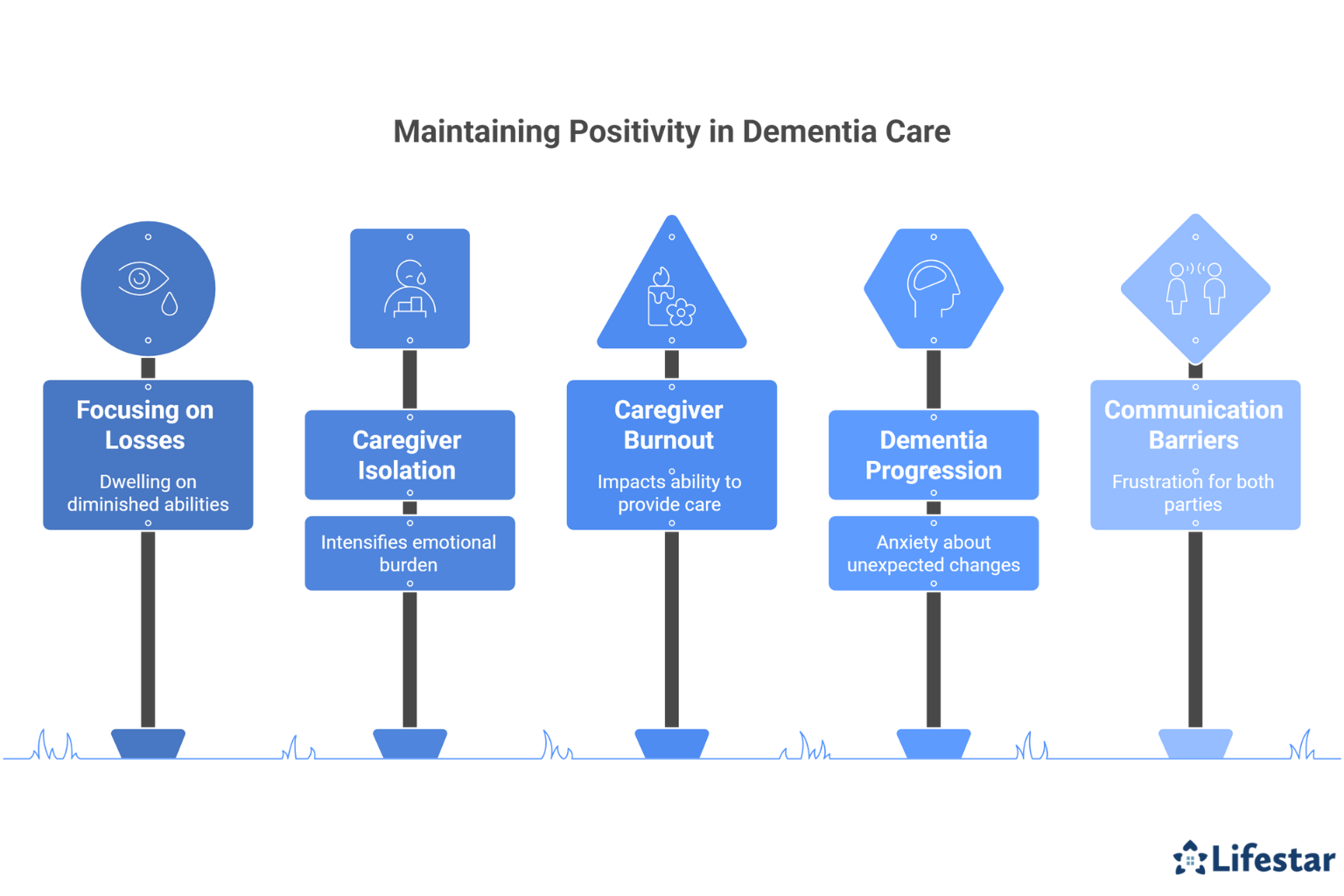
Table of Content
Caring for a senior loved one with dementia presents unique emotional challenges that can easily overwhelm even the most dedicated caregivers. Maintaining positivity while navigating this journey requires intentional strategies and realistic expectations. The key lies in finding sustainable approaches that support both your wellbeing and your loved one’s quality of life.
Focus on Meaningful Moments and Small Victories
Dementia care often feels like a series of losses, but shifting your focus toward the present can transform your daily experience. Rather than dwelling on what your loved one can no longer do, celebrate what remains possible and meaningful.
Create opportunities for connection that work within current abilities:
- Engage in simple activities like looking through photo albums or listening to familiar music.
- Share favorite foods or treats that bring comfort and joy.
- Enjoy sensory experiences like feeling soft fabrics or smelling flowers.
- Practice gentle physical touch like hand-holding or shoulder massage.
Document positive moments through photos, journal entries, or voice recordings. These reminders become valuable resources during difficult days when maintaining perspective feels impossible. A collection of smiles, laughter, or peaceful moments serves as tangible evidence that good days still exist.
Recognize small victories matter enormously. Successfully completing a familiar task, recognizing a family member’s face, or sharing a genuine laugh represents meaningful connection despite cognitive changes. These moments may become less frequent, but their significance actually increases over time.

Build and Maintain Your Support Network
Isolation intensifies the emotional burden of dementia caregiving and makes maintaining positivity nearly impossible. Building connections with others who understand your experience provides essential emotional support and practical guidance.
Connect with other dementia caregivers through:
- Local support groups offered through hospitals or community centers
- Online forums and social media groups focused on dementia caregiving
- Faith-based organizations that offer caregiver support programs
- Professional counselors who specialize in caregiver stress and grief
Share responsibilities with family members and friends who want to help. Many people feel uncertain about how to support dementia caregivers but genuinely want to contribute. Provide specific suggestions like bringing meals, staying with your loved one for short periods, or helping with household tasks.
Professional respite care services allow you to take necessary breaks without guilt. Adult day programs, in-home care providers, and temporary residential facilities give you time to recharge while ensuring your loved one receives appropriate supervision and care.
Family caregivers can manage many of the challenges of caregiving by hiring in-home care professionals. Families who need help caring for senior loved ones can turn to Lifestar Home Care, a leading provider of in-home care. Services available in our customizable care plans include meal prep, mental and social stimulation, assistance with personal hygiene tasks, and much more.
Practice Self-Care and Stress Management
Caregiver burnout directly impacts your ability to maintain a positive outlook and provide high-quality care. Prioritizing your physical and emotional health is essential for sustainable caregiving.
Establish nonnegotiable self-care practices:
- Maintain regular sleep schedules even when nights become challenging.
- Eat nutritious meals and stay hydrated throughout busy caregiving days.
- Exercise regularly, even if only through short walks or stretching routines.
- Engage in activities you enjoy, whether reading, crafting, or watching movies.
Recognize early warning signs of caregiver stress like persistent fatigue, irritability, social withdrawal, or physical symptoms. Addressing these signs promptly prevents more serious burnout and depression that can derail your caregiving journey.
Learn stress management techniques that work quickly during difficult moments. Deep breathing exercises, brief meditation, or stepping outside for fresh air can reset your emotional state when challenging behaviors or situations arise.
Family caregivers need to care for their own wellbeing. If you’re caring for an aging loved one and are feeling overwhelmed, consider hiring a professional caregiver to provide home care. Oklahoma City families who want to prevent burnout can turn to Lifestar Home Care. One of our professional caregivers can assist your loved one at home while you take a nap, go to work, run errands, or go on vacation.
Educate Yourself about Dementia Progression
Understanding dementia’s typical progression helps you set realistic expectations and reduces anxiety about unexpected changes. Knowledge empowers you to prepare for future challenges while appreciating current capabilities.
Learn about your loved one’s specific dementia type, since Alzheimer’s disease, vascular dementia, and other forms progress differently. This knowledge helps you anticipate likely changes and plan appropriate interventions.
Research behavioral strategies for common dementia symptoms:
- Sundowning and sleep disturbances
- Wandering and restlessness
- Confusion and disorientation
- Repetitive questions or behaviors
- Resistance to personal care
Connect with healthcare professionals who specialize in dementia care. Geriatricians, neurologists, and social workers provide valuable guidance for managing medical needs and accessing community resources. Encouraging fond memories in the golden years can complement medical care by boosting emotional wellbeing and fostering meaningful interactions. Regular check-ins help you stay informed about treatment options and support services.
Adapt Your Communication and Environment
Creating positive interactions becomes easier when you adjust communication styles and environmental factors to support your loved one’s changing needs. These adaptations reduce frustration for both of you while maximizing successful connections.
Modify your communication approach:
- Use simple, clear sentences and speak slowly.
- Make eye contact and use gentle, reassuring tones.
- Avoid arguing about confused memories or correcting mistakes.
- Redirect attention when challenging topics arise.
- Use visual cues and gestures to support verbal communication.
Environmental modifications can significantly enhance daily experiences. Reduce noise and distractions during meals and conversations. Ensure adequate lighting throughout the home. Remove or secure items that might cause confusion or safety concerns.
Establish consistent daily routines that provide structure and predictability. Regular mealtimes, medication schedules, and activity patterns can reduce anxiety and confusion while creating opportunities for positive interactions.
Caring for seniors with dementia can be challenging for family caregivers. Luckily, there is dementia care Oklahoma City families can rely on. Professional dementia caregivers help seniors with dementia stay safe and comfortable at home by preventing wandering, providing cognitive stimulation, and assisting with household chores. Lifestar Home Care can be your trusted partner when your loved one needs help with the challenges of aging. Call us today to learn about our high-quality in-home care services.